Unit 4 Why don't you talk to your parents ? Section B (2a-2e) 课件(共30张PPT)
文档属性
| 名称 | Unit 4 Why don't you talk to your parents ? Section B (2a-2e) 课件(共30张PPT) | 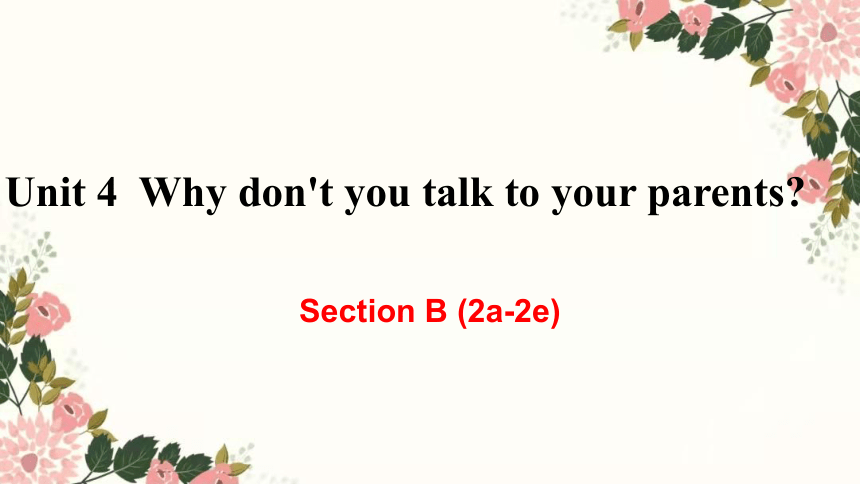 | |
| 格式 | zip | ||
| 文件大小 | 4.1MB | ||
| 资源类型 | 试卷 | ||
| 版本资源 | 人教新目标(Go for it)版 | ||
| 科目 | 英语 | ||
| 更新时间 | 2022-04-08 22:02:53 | ||
图片预览


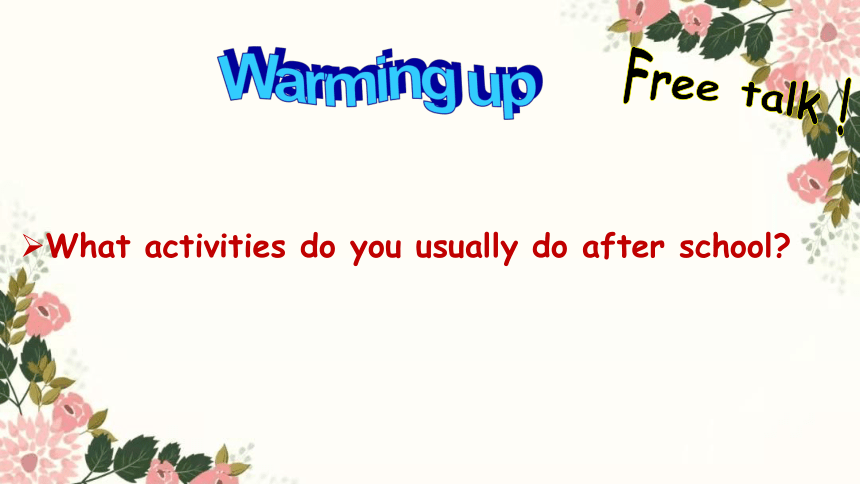
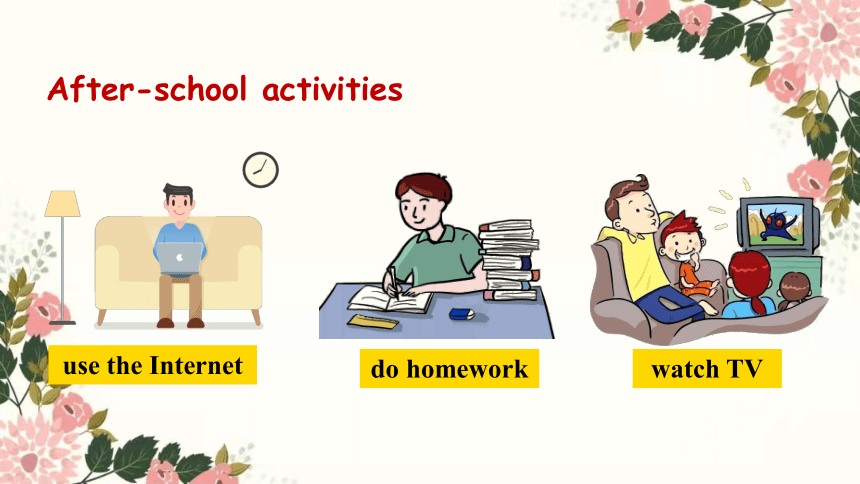
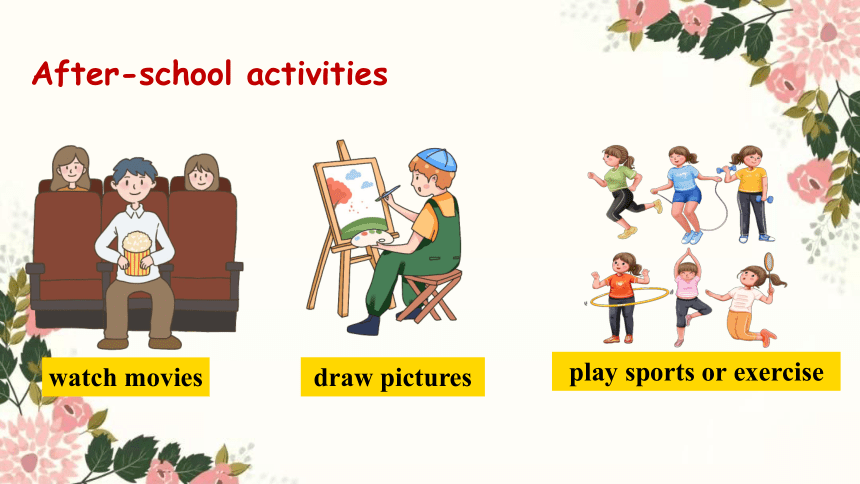
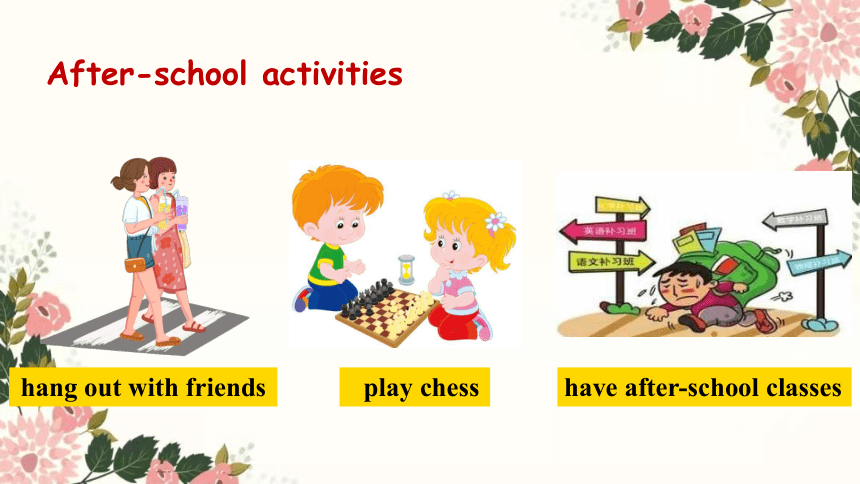

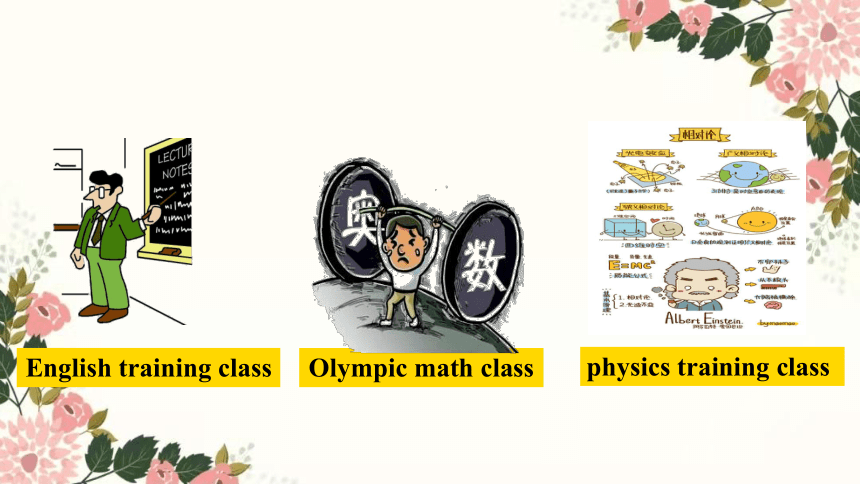
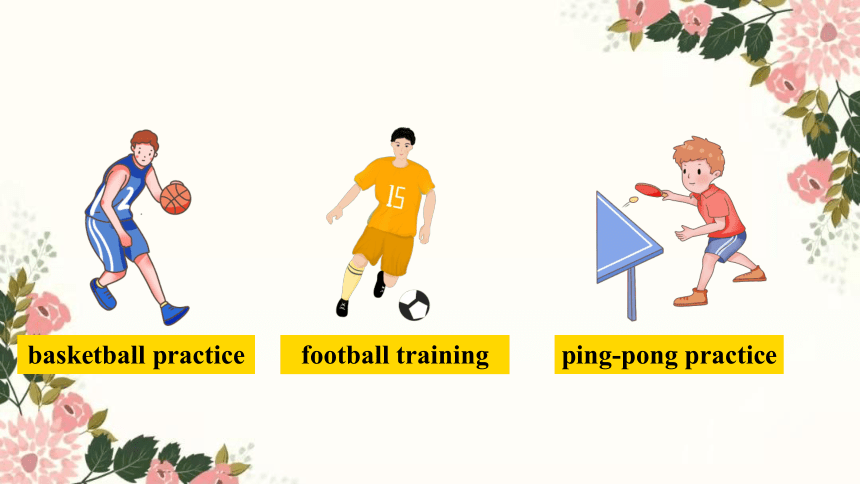
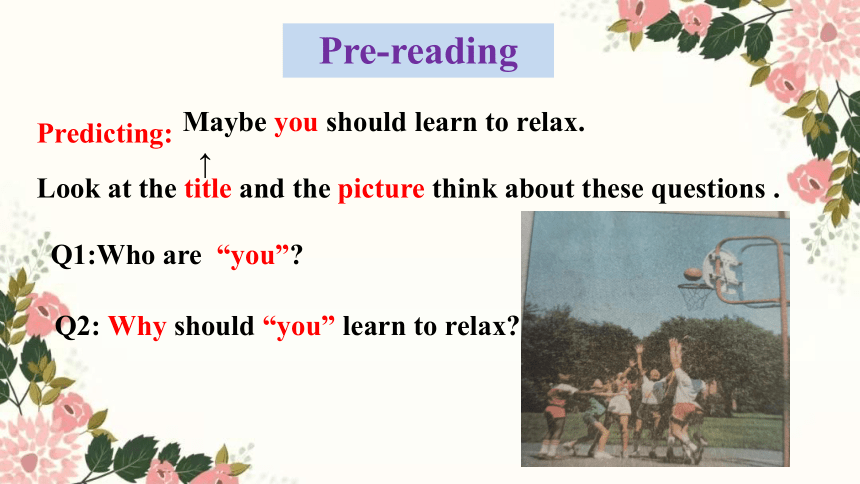
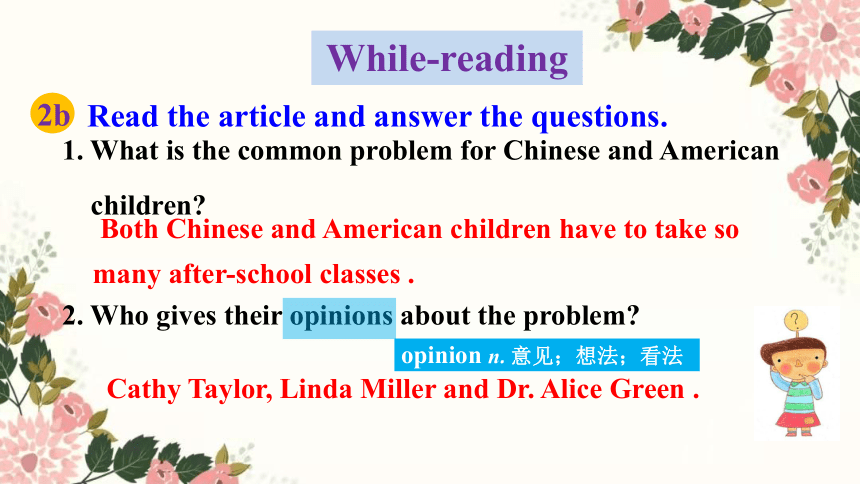
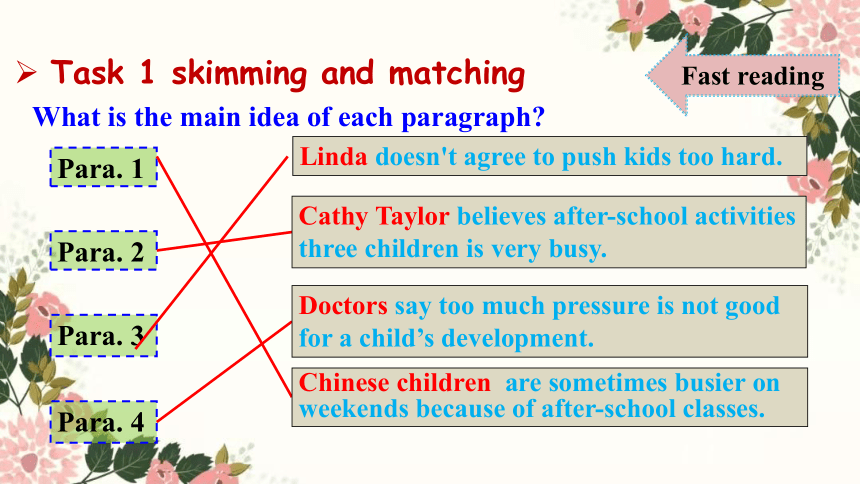
文档简介
(共30张PPT)
Section B (2a-2e)
Unit 4 Why don't you talk to your parents
Learning goals
By the end of the class, students will be able to
1.have a better understanding of after-school activities.
2.learn to relax in different ways.
Free talk !
Warming up
What activities do you usually do after school
watch TV
use the Internet
do homework
After-school activities
After-school activities
watch movies
draw pictures
play sports or exercise
After-school activities
hang out with friends
have after-school classes
play chess
What kinds of after-school classes do you have
dancing class
painting class
singing class
Lead-in
English training class
Olympic math class
physics training class
basketball practice
football training
ping-pong practice
Pre-reading
Predicting:
Look at the title and the picture think about these questions .
Maybe you should learn to relax.
↑
Q1:Who are “you”
Q2: Why should “you” learn to relax
2b
Read the article and answer the questions.
1. What is the common problem for Chinese and American
children
2. Who gives their opinions about the problem
opinion n. 意见;想法;看法
While-reading
Both Chinese and American children have to take so many after-school classes .
Cathy Taylor, Linda Miller and Dr. Alice Green .
Task 1 skimming and matching
What is the main idea of each paragraph
Para. 1
Para. 2
Para. 3
Para. 4
Fast reading
Chinese children are sometimes busier on weekends because of after-school classes.
Cathy Taylor believes after-school activities three children is very busy.
Linda doesn't agree to push kids too hard.
Doctors say too much pressure is not good for a child’s development.
Task 2 Scanning for details
Read Para.1 carefully and finish the mind map.
busier
take
exam
skills
get
into
practicing
compete
Task 3 Scanning and judging
Read Para. 2 . Are the following statements are true(T) or false (F).
1.Cathy Taylor’s three kids are busy.
(T)
2.Cathy Taylor took one of her two boys to football training.
3.Cathy Taylor won’t cut out her children’s activities.
4.Cathy Taylor’s three kids can have a rest after dinner.
(F)
(F)
(T)
Task 4 Scanning for details
Read Para.3 carefully and answer the questions.
1.Does Linda agree with Cathy
2.What is Linda’s opinion on the fact that parents send their small kids to all kinds of classes
No, she doesn’t .
Her opinion is that people shouldn’t push their kids so hard and they should let kids be kids.
Task 5 Scanning for details
Read Para.4 carefully and answer the questions .
1.What is the result of too many after-school activities
All these activities can cause a lot of stress and too much pressure is not good for children’s development.
2.What does Dr. Alice Green think kids should do
He thinks kid should have to relax and think for themselves.
Post reading: discuss the questions with your partner.
1. What do you think of after-school activities
Advantages Disadvantages
help to develop exam skills have no time for myself
can help to compete and win cause a lot of stress for children
can help students relax like singing and painting. cost a lot of money
--- ---
In my opinion ,kids should(n’t) take after-school classes ,because---
2. What should you do to relax
I think we should listen to music /read books /watch a film /do sports /hang out with our friends---- to relax.
Maybe You Should Learn to Relax!
These days, Chinese children are sometimes busier on weekends than weekdays because they have to take so many after-school classes. Many of them are learning exam skills so that they can get into a good high school and later a good university. Others are practicing sports so that they can compete and win. However, this doesn’t only happen in China.
“为了;以便”,引导目的状语从句
skill n. 技艺;技巧
The Taylors are a typical American family. Life for Cathy Taylor's three children is very busy. “On most days after school,” Cathy says, “I take one of my two boys to basketball practice and my daughter to football training. Then I have to take my other son to piano lessons. Maybe I could cut out a few of their activities, but I believe these activities are important for my children's future. I really want them to be successful.” However, the tired children don’t get home until after 7:00 p.m. They have a quick dinner, and then it's time for homework.
删除;删去
adj. 成功的;有成就的
“直到”,引导时间状语从句
adj. 快的;迅速的
It's time for sth. 到做某事的时间了
adj. 典型的
the + 姓氏的复数形式 “……一家人/...夫妇”
Linda Miller, a mother of three, knows all about such stress. “In some families, competition starts very young and continues until the kids get older,” she says.“Mothers send their small kids to all kinds of classes. And they are always comparing them with other children. It’s crazy. I don’t think that's fair. Why don't they just let their kids be kids People shouldn't push their kids so hard.”
adj. 不理智的;疯狂的
compare…with 比较;对比
continue v. 持续;继续存在
v. 鞭策;督促
Doctors say too much pressure is not good for a child's development. Dr. Alice Green says all these activities can cause a lot of stress for children. “Kids should have time to relax and think for themselves, too. Although it's normal to want successful children, it's even more important to have happy children.”
v. 造成;引起
n. 发展;成长
“尽管;然而”,引导的让步状语从句
be good for 对……有好处
Language points
1. Maybe I could cut out a few of their activities, but I believe these activities are important for my children's future.
代词作宾语时,只能放在cut与out之间。
cut out 删除;删去
This sentence is not necessary. Please cut it out.
【拓展延伸】cut的相关短语
cut up 切碎
cut off 中断;切除
cut down 砍倒;削减;降低
cut in 插话;超车
2. I really want them to be successful.
be successful in (doing) sth.“在(做)……方面取得成功” 。
successful adj. 成功的;有成就的
Parents want their children successful .
success n. 成功;成功的人或事 Our festival show will be a great success.
succeed v. 成功 He succeeded in the exam this time.
successfully adv. 成功地 He finished his work successfully .
3. And they are always comparing them with other children.
be always doing sth. 表示说话人的某种情绪,例如不满、赞扬、不耐烦等。
be always doing sth. 一直/总是做某事
She is always arriving late for class.
【特别提醒】be always doing sth. 不强调动作正在进行。
compare... with… 把……与……比较 用于两个同类事物之间的比较。
compare...to… 把……比作 常用于两个不同性质事物之间的比较,含有比喻意味。 we usually compared ourselves with others.
We usually compare books to friends.
4. People shouldn't push their kids so hard.
push v. 鞭策;督促;推动
push在此作动词,意为“鞭策;督促”。
push sb. to do sth. 意为“督促某人做某事。
She thanks her parents for pushing her to study.
push 还可意为“推动”,其反义词是pull“拉”。
5. Dr. Alice Green says all these activities can cause a lot of stress for children.
cause v. 造成;引起
cause作及物动词,常用结构:
She is always causing her parents trouble.
= She is always causing trouble for her parents.
What caused him to change his mind
【拓展延伸】cause还可作名词,意为“原因,起因;理由。”
cause sb. sth.=cause sth. for sb. 给某人带来某事(多指麻烦)
cause sb. to do sth. 导致某人做某事
The police tried to find out the cause of the accident.
Homework
1. Read and recite the new words and phrases.
2. Do the exercises in students’ book.
Thank you!
Section B (2a-2e)
Unit 4 Why don't you talk to your parents
Learning goals
By the end of the class, students will be able to
1.have a better understanding of after-school activities.
2.learn to relax in different ways.
Free talk !
Warming up
What activities do you usually do after school
watch TV
use the Internet
do homework
After-school activities
After-school activities
watch movies
draw pictures
play sports or exercise
After-school activities
hang out with friends
have after-school classes
play chess
What kinds of after-school classes do you have
dancing class
painting class
singing class
Lead-in
English training class
Olympic math class
physics training class
basketball practice
football training
ping-pong practice
Pre-reading
Predicting:
Look at the title and the picture think about these questions .
Maybe you should learn to relax.
↑
Q1:Who are “you”
Q2: Why should “you” learn to relax
2b
Read the article and answer the questions.
1. What is the common problem for Chinese and American
children
2. Who gives their opinions about the problem
opinion n. 意见;想法;看法
While-reading
Both Chinese and American children have to take so many after-school classes .
Cathy Taylor, Linda Miller and Dr. Alice Green .
Task 1 skimming and matching
What is the main idea of each paragraph
Para. 1
Para. 2
Para. 3
Para. 4
Fast reading
Chinese children are sometimes busier on weekends because of after-school classes.
Cathy Taylor believes after-school activities three children is very busy.
Linda doesn't agree to push kids too hard.
Doctors say too much pressure is not good for a child’s development.
Task 2 Scanning for details
Read Para.1 carefully and finish the mind map.
busier
take
exam
skills
get
into
practicing
compete
Task 3 Scanning and judging
Read Para. 2 . Are the following statements are true(T) or false (F).
1.Cathy Taylor’s three kids are busy.
(T)
2.Cathy Taylor took one of her two boys to football training.
3.Cathy Taylor won’t cut out her children’s activities.
4.Cathy Taylor’s three kids can have a rest after dinner.
(F)
(F)
(T)
Task 4 Scanning for details
Read Para.3 carefully and answer the questions.
1.Does Linda agree with Cathy
2.What is Linda’s opinion on the fact that parents send their small kids to all kinds of classes
No, she doesn’t .
Her opinion is that people shouldn’t push their kids so hard and they should let kids be kids.
Task 5 Scanning for details
Read Para.4 carefully and answer the questions .
1.What is the result of too many after-school activities
All these activities can cause a lot of stress and too much pressure is not good for children’s development.
2.What does Dr. Alice Green think kids should do
He thinks kid should have to relax and think for themselves.
Post reading: discuss the questions with your partner.
1. What do you think of after-school activities
Advantages Disadvantages
help to develop exam skills have no time for myself
can help to compete and win cause a lot of stress for children
can help students relax like singing and painting. cost a lot of money
--- ---
In my opinion ,kids should(n’t) take after-school classes ,because---
2. What should you do to relax
I think we should listen to music /read books /watch a film /do sports /hang out with our friends---- to relax.
Maybe You Should Learn to Relax!
These days, Chinese children are sometimes busier on weekends than weekdays because they have to take so many after-school classes. Many of them are learning exam skills so that they can get into a good high school and later a good university. Others are practicing sports so that they can compete and win. However, this doesn’t only happen in China.
“为了;以便”,引导目的状语从句
skill n. 技艺;技巧
The Taylors are a typical American family. Life for Cathy Taylor's three children is very busy. “On most days after school,” Cathy says, “I take one of my two boys to basketball practice and my daughter to football training. Then I have to take my other son to piano lessons. Maybe I could cut out a few of their activities, but I believe these activities are important for my children's future. I really want them to be successful.” However, the tired children don’t get home until after 7:00 p.m. They have a quick dinner, and then it's time for homework.
删除;删去
adj. 成功的;有成就的
“直到”,引导时间状语从句
adj. 快的;迅速的
It's time for sth. 到做某事的时间了
adj. 典型的
the + 姓氏的复数形式 “……一家人/...夫妇”
Linda Miller, a mother of three, knows all about such stress. “In some families, competition starts very young and continues until the kids get older,” she says.“Mothers send their small kids to all kinds of classes. And they are always comparing them with other children. It’s crazy. I don’t think that's fair. Why don't they just let their kids be kids People shouldn't push their kids so hard.”
adj. 不理智的;疯狂的
compare…with 比较;对比
continue v. 持续;继续存在
v. 鞭策;督促
Doctors say too much pressure is not good for a child's development. Dr. Alice Green says all these activities can cause a lot of stress for children. “Kids should have time to relax and think for themselves, too. Although it's normal to want successful children, it's even more important to have happy children.”
v. 造成;引起
n. 发展;成长
“尽管;然而”,引导的让步状语从句
be good for 对……有好处
Language points
1. Maybe I could cut out a few of their activities, but I believe these activities are important for my children's future.
代词作宾语时,只能放在cut与out之间。
cut out 删除;删去
This sentence is not necessary. Please cut it out.
【拓展延伸】cut的相关短语
cut up 切碎
cut off 中断;切除
cut down 砍倒;削减;降低
cut in 插话;超车
2. I really want them to be successful.
be successful in (doing) sth.“在(做)……方面取得成功” 。
successful adj. 成功的;有成就的
Parents want their children successful .
success n. 成功;成功的人或事 Our festival show will be a great success.
succeed v. 成功 He succeeded in the exam this time.
successfully adv. 成功地 He finished his work successfully .
3. And they are always comparing them with other children.
be always doing sth. 表示说话人的某种情绪,例如不满、赞扬、不耐烦等。
be always doing sth. 一直/总是做某事
She is always arriving late for class.
【特别提醒】be always doing sth. 不强调动作正在进行。
compare... with… 把……与……比较 用于两个同类事物之间的比较。
compare...to… 把……比作 常用于两个不同性质事物之间的比较,含有比喻意味。 we usually compared ourselves with others.
We usually compare books to friends.
4. People shouldn't push their kids so hard.
push v. 鞭策;督促;推动
push在此作动词,意为“鞭策;督促”。
push sb. to do sth. 意为“督促某人做某事。
She thanks her parents for pushing her to study.
push 还可意为“推动”,其反义词是pull“拉”。
5. Dr. Alice Green says all these activities can cause a lot of stress for children.
cause v. 造成;引起
cause作及物动词,常用结构:
She is always causing her parents trouble.
= She is always causing trouble for her parents.
What caused him to change his mind
【拓展延伸】cause还可作名词,意为“原因,起因;理由。”
cause sb. sth.=cause sth. for sb. 给某人带来某事(多指麻烦)
cause sb. to do sth. 导致某人做某事
The police tried to find out the cause of the accident.
Homework
1. Read and recite the new words and phrases.
2. Do the exercises in students’ book.
Thank you!
同课章节目录
- Unit 1 What's the matter?
- Section A
- Section B
- Unit 2 I'll help to clean up the city parks.
- Section A
- Section B
- Unit 3 Could you please clean your room?
- Section A
- Section B
- Unit 4 Why don't you talk to your parents?
- Section A
- Section B
- Unit 5 What were you doing when the rainstorm came
- Section A
- Section B
- Review of Units 1-5
- Unit 6 An old man tried to move the mountains.
- Section A
- Section B
- Unit 7 What's the highest mountain in the world?
- Section A
- Section B
- Unit 8 Have you read Treasure Island yet?
- Section A
- Section B
- Unit 9 Have you ever been to a museum?
- Section A
- Section B
- Unit 10 I've had this bike for three years.
- Section A
- Section B
